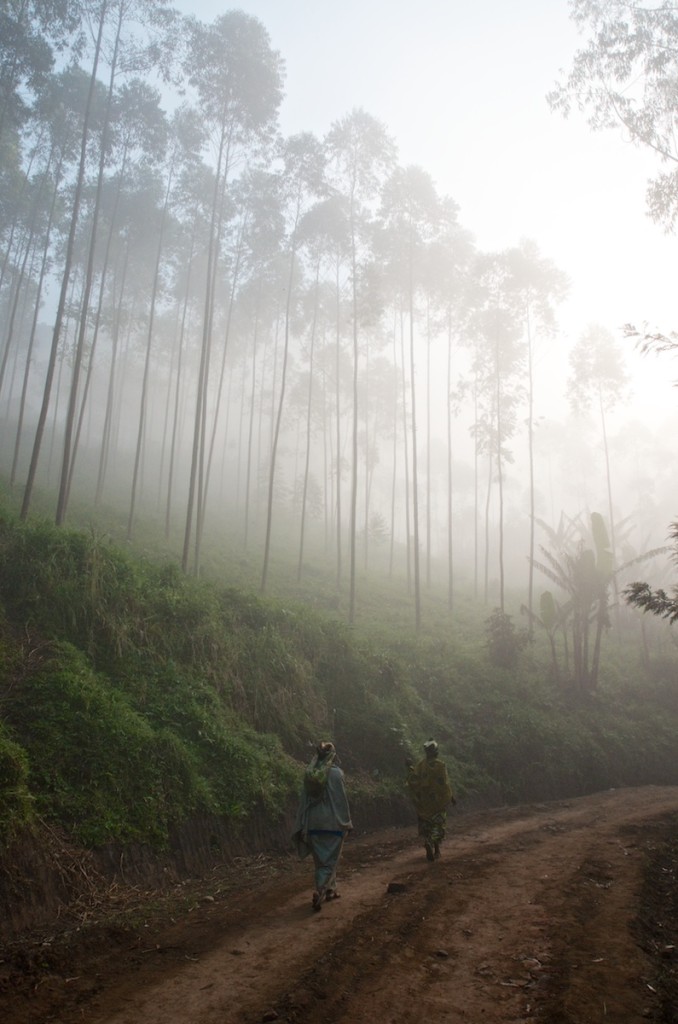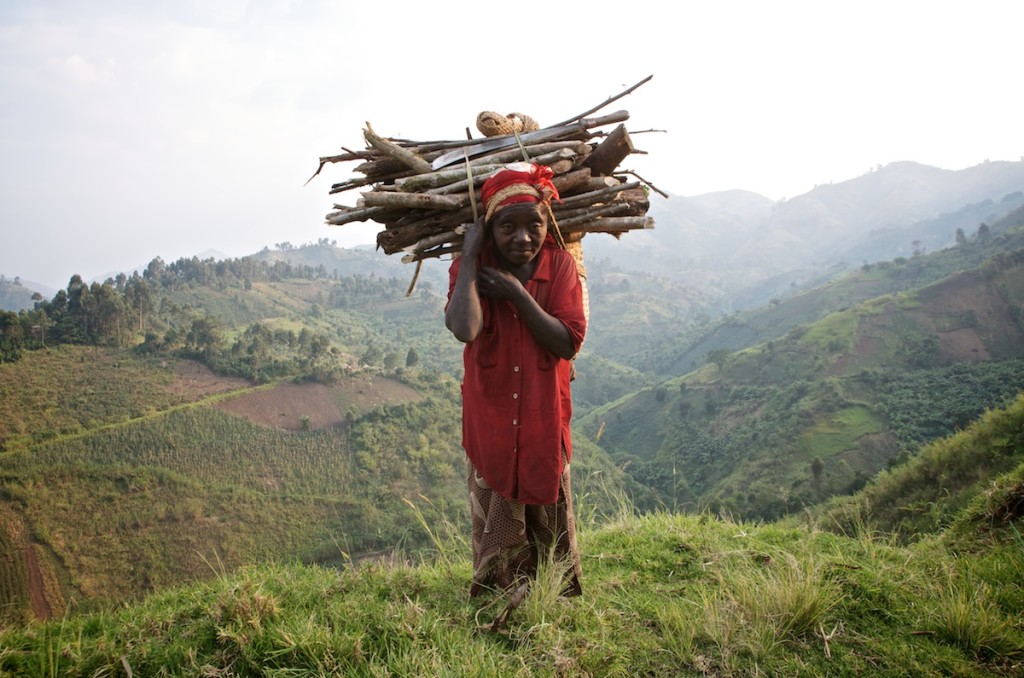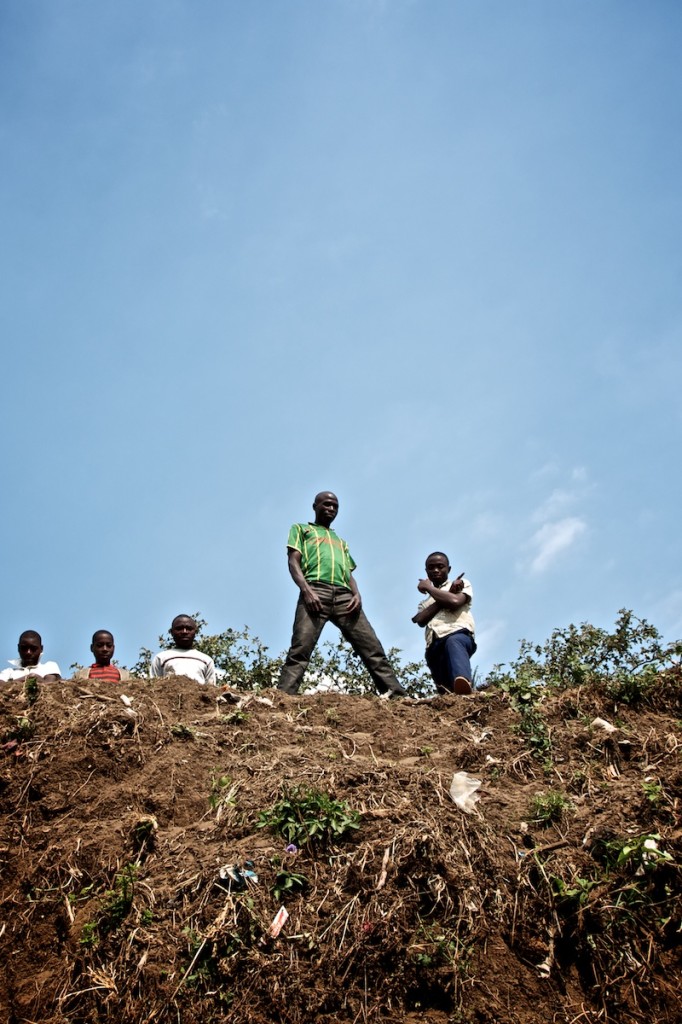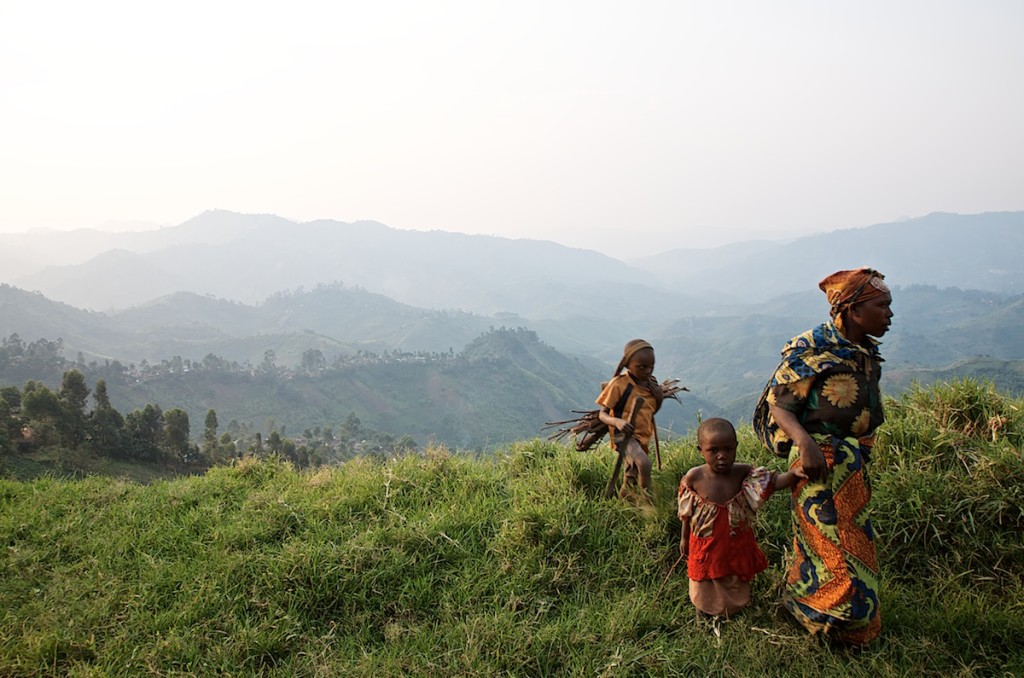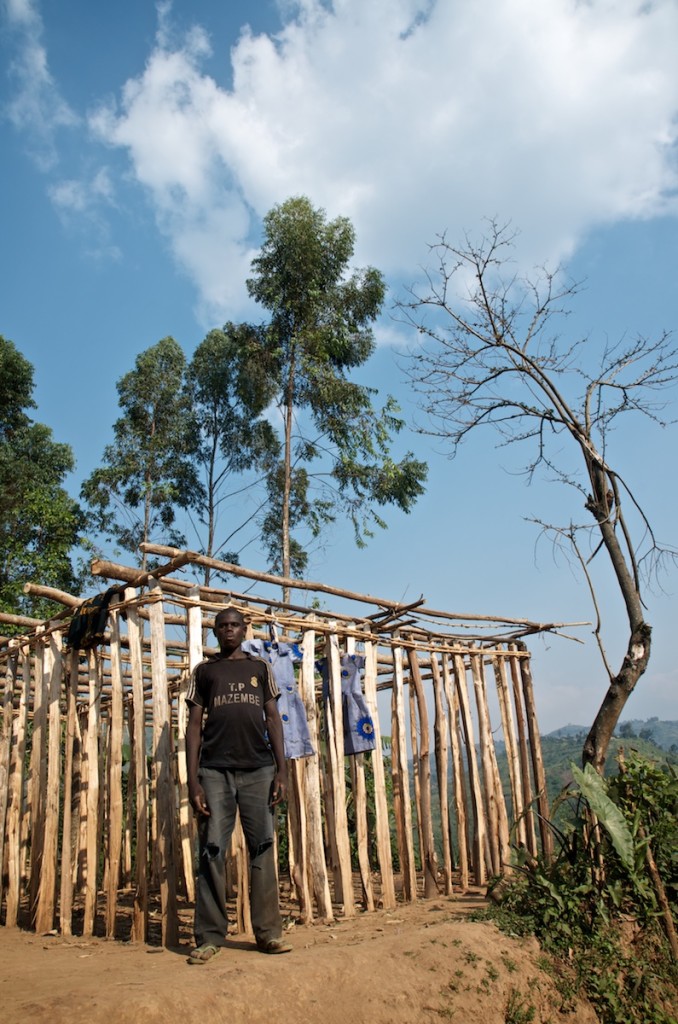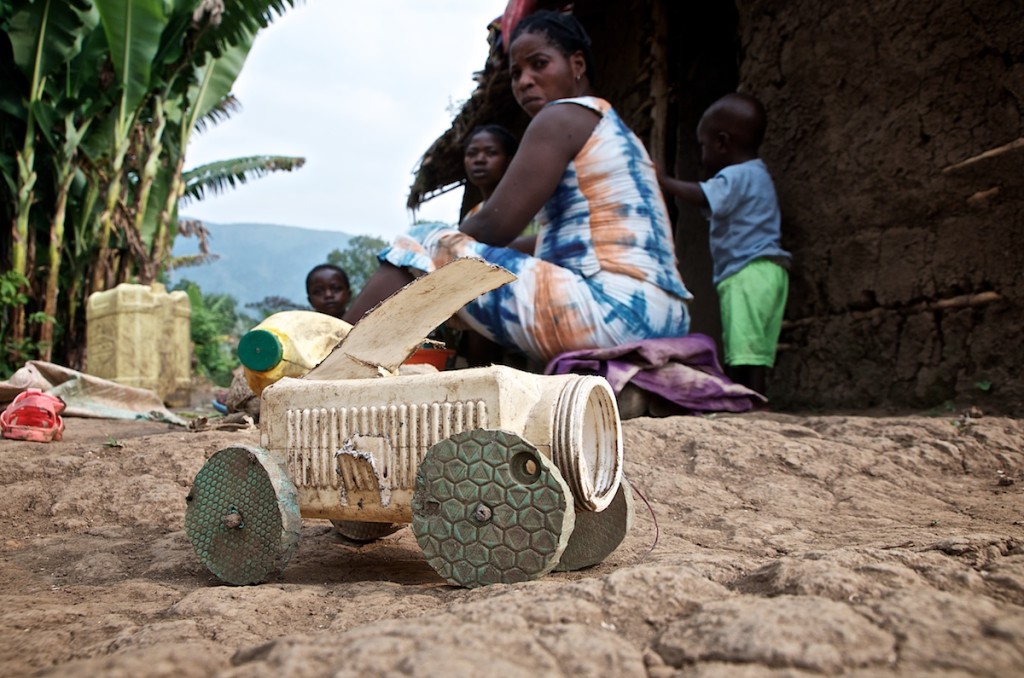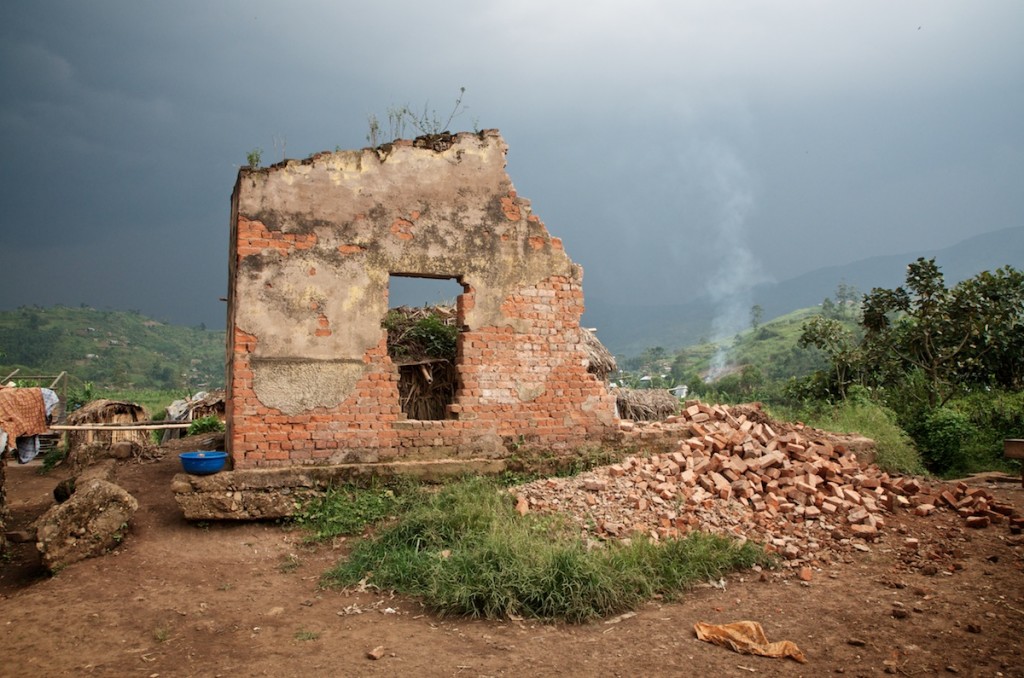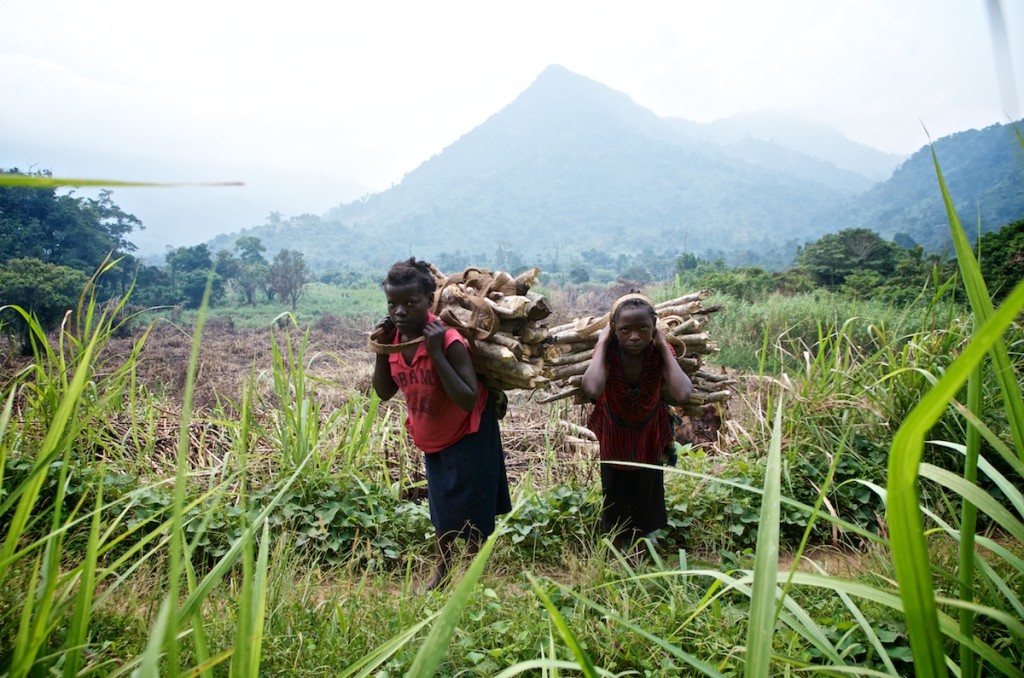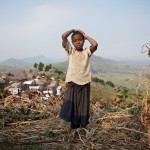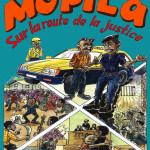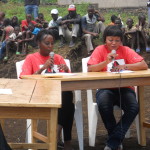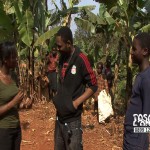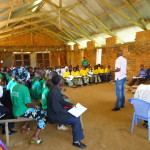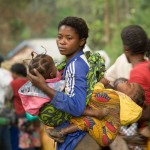Local Voices – Power, land and identity: the origins of violence in Masisi
Since independence was declared in the Congo, the history of Masisi has been marked by high tensions over the control of power and land between the three major communities in this territory: the Hunde, the Hutus and the Tutsis.
At the heart of these tensions is the issue of land rights and the power exercised by, or denied to, the different communities. Since 1994, regional conflicts have heightened these local tensions and reshaped the landscape of conflict in Masisi, and eastern Congo. Right up to the present day, the distribution of power remains a particularly sensitive stumbling block between local communities.
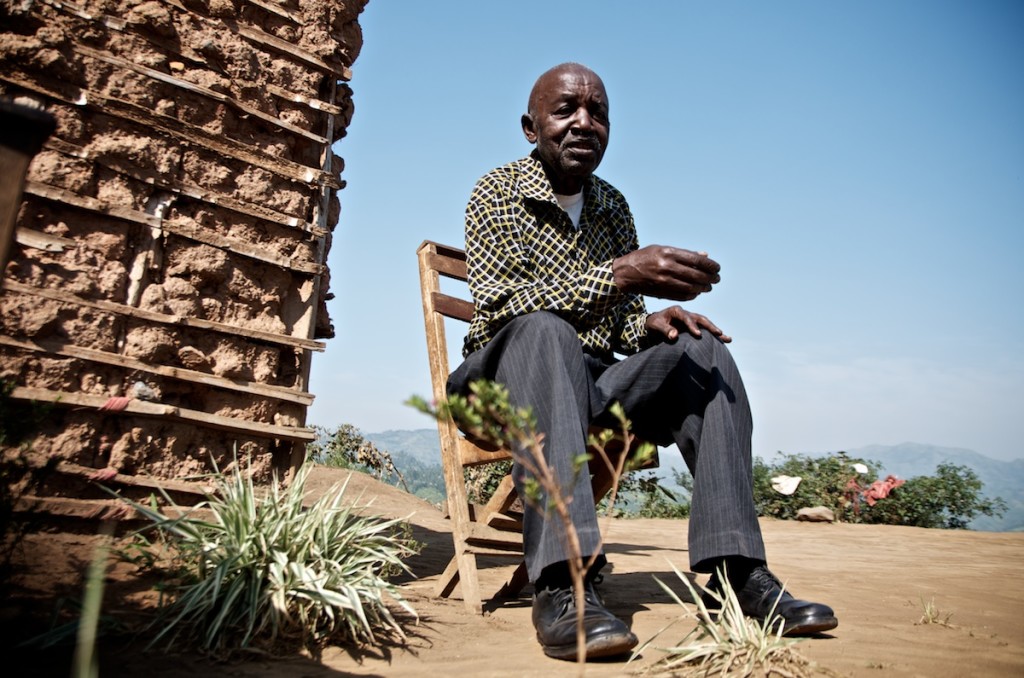
A member of the royal family within the Hunde community, Mwami Michel Bapfuna, has been the head of the Bapfuna groupement since the early 1960s. For the past twenty years he has not been able to access the majority of his land. Masisi Town, North Kivu, August 2013.
The traditional Hunde leaders in the Masisi territory almost all share the same complaint: they can no longer wield their power freely, as they did in the past when Mobutu ruled Zaire. For the past 20 years, large parts of their customary entities (divisions of land) have effectively been in the hands of armed groups; they simply do not have access to their land anymore and fear for their lives if they dare to go to the villages which they are supposed to administrate. Some heads of the groupement (a local customary and politico-administrative division) whom we met in central Masisi provided specific examples to illustrate these facts. The head of the Bapfuna groupement controls only one of the six villages within his groupement, the heads of the Buabo and the Bihiri groupement each control one out of their respective five villages, and the head of the Banyungu controls half of one of his two villages.
“Some people gave themselves permission to use weapons to take our power,” the eldest of them tells us, whilst the others agree. These big men, named ‘usurpers’ by the Hunde leaders, have, for the most part, come from the Hutu community and, through war and rebellions, have managed to bring about the recognition of the right for which they have been advocating for years: the right to administrate the land where they live and where they are the largest ethnic group.
These demands are unacceptable to the Hunde leaders. For them, this land comes from the ‘ancestors’ and can only be looked after by the traditional leaders. The Hunde believe that the people who came from Rwanda (the Hutus and Tutsis) only several generations ago, could not possibly carry out such a role. In the Hunde discourse, only the ‘autochthonous’ can be traditional leaders, by which they mean the Hunde.
This belief in the Hunde primacy of customary power has its roots in the history of the settlement of eastern Congo, and in Masisi in particular. The Hunde community settled in Masisi before the Hutu and Tutsi communities, who arrived in the area in the 1930s to 1950s as a result of migrations organized by the Belgian colonizers, who were looking for workers for their colonial plantations, as well as due to the political situation in Rwanda in the 1950s.
As time went by, the Hutu community grew larger than the Hunde community who had originally occupied the land. The Hutus (and, with them, the Tutsis) wanted to liberate themselves both economically and politically from the authority of the Hunde’s traditional leaders. The Chef de Poste d’Encadrement (an administrative – non customary – official) for Lushebere, a Hutu leader, disputes the Hunde leaders’ complaints by saying, “The Hunde leaders are our traditional leaders, and we accept them as such.” Despite this, Hunde leaders often rise up against him when they accuse Hutu leaders of having stolen their power. They cite him as the ‘big man’ of the area, and claim that he has authority over the Nyatura, a Hutu militia who are active in the area. He defends himself against these accusations by saying, “I am the Chef de Poste d’Encadrement for Lushebere. My aim is to develop my area. The traditional leaders don’t do anything. They don’t have offices. They are weak and almost never work!”
Even if inter-community tensions date back to the colonial period, they worsened after independence and throughout the 1970s and 1980s, due to the huge inequalities in land rights between small cultivators and large land owners. These grievances stemmed from both land owners reshaping local ethnic divisions through the introduction of a political system based on elections, as well as from changes to the law on nationality which, at the beginning of the 1980s, called into question the nationality and Congolese citizenship of Rwandophone populations. Twice, at the beginning of the 1960s and in 1993, during electoral seasons and due to influence by political leaders who manipulated ethnic allegiances for their own ends, the situation broke down into open confrontations between ethnic militias.
Emmanuel Munyamariba, the Chef de Poste for Lushebere recalls this period of unrest. At the end of the 1980s, tribal “mutualités” get organized with the Hutu MAGRIVI, the Virunga Farmers’ Association, and the Bushenge Hunde (literally, the Hunde’s meeting place). Originally a means of solidarity between members of the same community, these two associations became the spearhead of ethnic militias who confronted each other in 1993. In 1989, M. Munyamariba became the Secretary of the MAGRIVI. He explains, “the MAGRIVI quickly understood that the Bushenge Hunde planned to drive out the Hutus, to send them back to Rwanda. For me, for example, my grandfather arrived in Masisi in 1930. Where would I go in Rwanda? Thus the young Hutus put up a fight and took on the young Hunde. That’s how we came to exterminate each other.”
The NGO Médecins Sans Frontières (Doctors without Borders) estimates that the interethnic violence in Masisi territory in 1993 caused between 6,000 and 15,000 deaths over a period of three months. For the local population, this first round of violence marked the beginning of a war which was not going to stop easily.
Apart from the huge displacement of populations and the change of the ethnic layout of the territory, this violence also reshaped the local political landscape in Masisi, as the Chef de Poste for Lushebere went on to explain, “Before 1993, all the positions (traditional and administrative) were in the hands of the Hunde. There was not a single Hutu Principal, for example. As well as the traditional leaders, all the secretaries and the administrators were always Hunde. The tribal war of 1993 changed that; we started to govern ourselves. The Hutus became the heads of the area. We had tasted authority and, once you’ve tasted it, it’s hard to stop! We often say that it is better to die than to give up power…”
He continues, “But then, Laurent Kabila’s AFDL (the Alliance of Democratic Forces for the Liberation of the Congo) arrived (in 1996) and told us to put an end to the tribal wars. They told us that we would overthrow Mobutu’s government and that, in the new government, there would be room for everyone. At that point we said to each other, ‘let’s share the responsibilities, let’s put Hutu secretaries to work with the Hunde leaders….’ That’s how, today, the area chiefs are often Hunde and their secretaries are Hutu.”
The Chef de Poste’s secretary rejects as well the Hunde leaders’ accusations. “It’s completely untrue to say that traditional power was usurped by force!” he says. “Right until today, there is not a single area which is managed by a Hutu or a Tutsi. There are obviously traditional leaders who fled their areas because of insecurity, but they left an intermediary who continues to report back to them. Look for just one official document signed by a Head of groupement from the Hutu community! There aren’t any!” he explains, without recognition of the Hunde traditional leaders’ complaints.
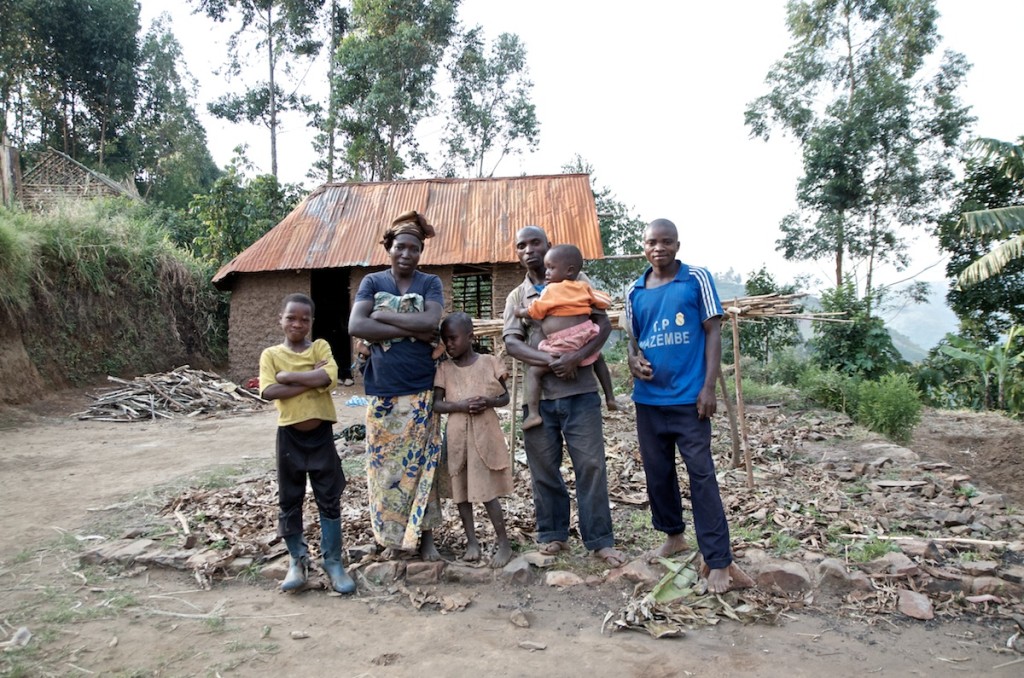
A Hutu family from the Bibotobolo village, in the Masisi territory, in the ruins of their former home, which was destroyed during the interethnic violence at the end of 2012. Having spent several months in a camp for displaced people, they have just finished building a new home (behind them), specifically by reusing the charred corrugated iron sheets from their former lodgings. Bibotobolo, Masisi, June 2013.
Regional wars and rebellions: the emergence of the Chef de Poste administrative positions.
The arrival in 1994 of two million Hutu Rwandan refugees, including many genocidaires (genocide perpetrators), into the Kivus, and the two Congolese wars of 1996-97 and 1998-2003, increased the existing tensions between communities in Masisi. The communities were swallowed up by the regional dynamics of these wars which involved almost all of the countries in the Great Lakes Region.
The belligerents exploited the fears of the local ethnic groups in order to win them over to their cause and to swell the numbers of their combatants. For their part, numerous local leaders made use of the wars and its many opportunities for new alliances to develop their political and land-related agendas. In Masisi, the second war from 1998 – 2003 set the Congolese government of Laurent-Désiré Kabila against the rebellions supported by the neighboring countries. The Hunde community (with a few key exceptions) aligned itself with the government (through joining Maï-Maï armed groups) while the Hutu and Tutsi communities (also with a few key exceptions) took the side of the RCD (the Congolese Rally for Democracy) which, with the support of Rwanda and Uganda, occupied a large part of the Kivus.
By the end of the war, with massacres committed along ethnic lines, the hatred between the communities in Masisi and the Kivus had grown exponentially.
The RCD era coincided with further changes to local power structures in Masisi. As elsewhere, the RCD leaders wanted to bring power closer to the rural, and often landlocked, populations. The rebellion created several new state Postes d’Encadrement, taking their number from 12 to 27. The Hutu community was the largest in the territory and supported the RCD, and they benefited most from the new positions, to the great displeasure of the Hunde traditional leaders who saw their roles taken over by the new Hutu leaders.
The Chef de Poste for Nyabiondo, from the Hunde community, explained to us that this expansion of the Postes d’Encadrement and their recognition by the central government had been as well a strategy to try to end the war. “It was a way to keep the former warlords busy,” he said. It was a strategy that certainly made the traditional leaders ‘uncomfortable.’
However, as part of the decentralization process, a new institutional structure will now be implemented, and this does not include the Poste d’Encadrement positions. What will happen to the Hutu leaders who hold most of these positions in Masisi? “They will go and work in the new communes (which will be created through decentralization),” explained the Chef de Poste for Lushebere. “Even I have got to try to get myself elected as mayor, if I’m lucky!” Another leader in Lushebere is still concerned that decentralization could lead to unemployment for a large number of the current local leaders. He told us, “This would have a huge impact on peace in our area!”
Whether power has been usurped or not, these statements demonstrate how bitter the disagreement over local power sharing is between the community leaders in Masisi.
While the most recent national elections (in November 2011) were heavily contested, particularly in the territory of Masisi, the provincial and local elections will be the next key date for the territory’s leaders and all of the communities. Before this major event in local political life, the priorities must be to establish a more peaceful environment between the communities in Masisi and between their respective leaders. Amidst the games and sometimes deadly political calculations, it is always the local populations who find themselves trapped first.
Disclaimer
Adopting the voice of the local actors does not mean that International Alert, Local Voices or Search For Common Ground endorse their views or defend their ’cause’. Instead we seek to communicate the fears, beliefs and wishes of local people in order to contribute to a search for sustainable peacebuilding solutions. To find out more about the approach of the project, see here.
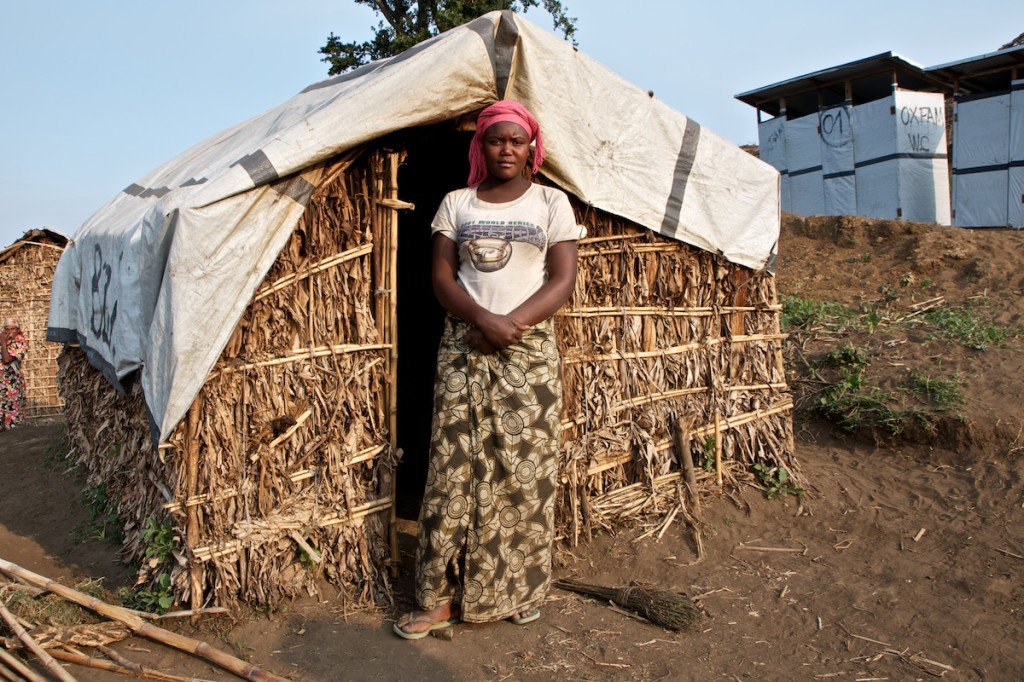
Young Sifa, 18 years old, in front of the shelter where she has been living with her parents since November 2012, in the Katale camp. Masisi, August 2013.
……………………………………………………………..
Text and photographs: Alexis Bouvy.
Facilitation in the field: Chrispin Mvano and Rodolpe Mukundi.
For more information on the context of armed conflicts in North Kivu, see Jason Stearns (2012), North Kivu. The Background to Conflict in North Kivu, Usalama Project, Rift Valley Institute, Nairobi.
See also the International Alert report, including a critical perspective of peace actions carried out or supported by the Congolese authorities and international actors: Ending the Deadlock. Towards a New Vision of Peace in Eastern DRC.
On negative discourses and stereotypes in DRC, see International Alert’s report: Words That Kill. Rumours, Prejudice, Stereotypes and Myths Amongst the People of the Great Lakes Region of Africa.
Local Voices – Congolese Communities & The Kivu Conflict enjoys the support of International Alert and Search for Common Ground.
© Local Voices 2013 with International Alert & Search For Common Ground.

